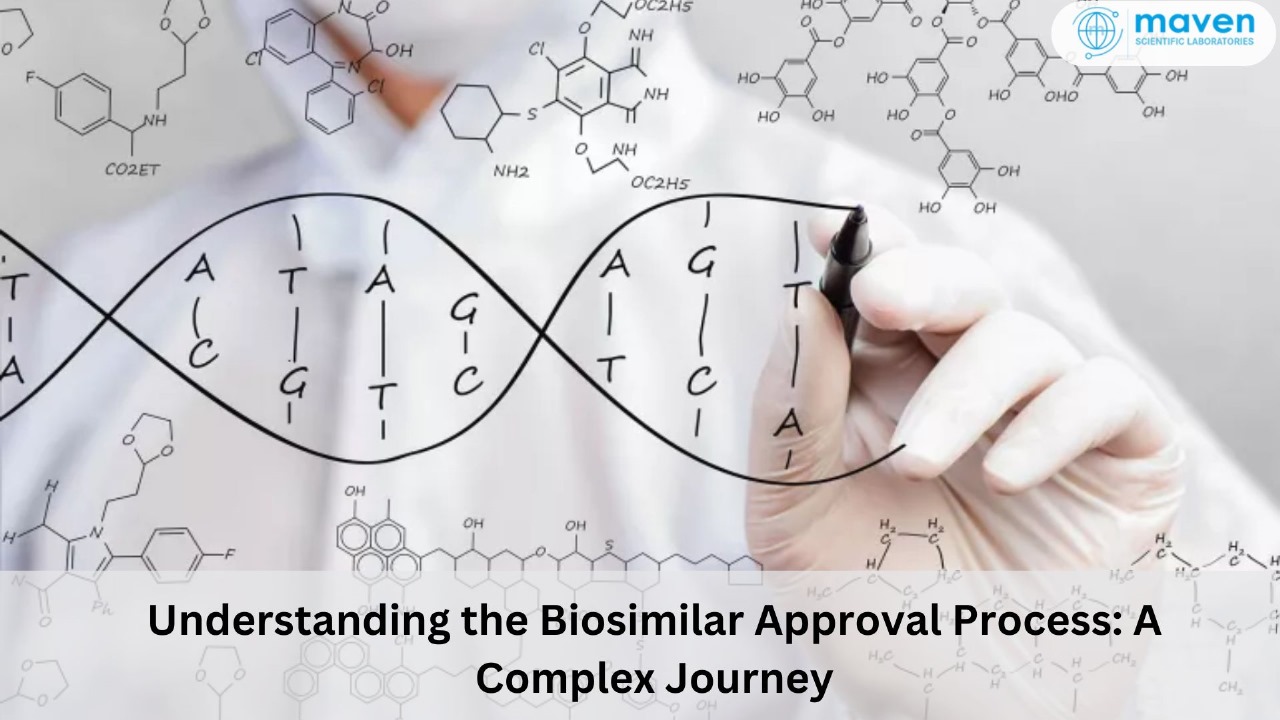January 20, 2025
Biosimilars represent a transformative advancement in the pharmaceutical industry, offering cost-effective alternatives to reference biologics while maintaining comparable safety, efficacy, and quality. However, the journey to bring a biosimilar to market is intricate, reflecting the complexity of biologics themselves. This detailed blog explores the biosimilar approval pathway, key challenges, and how Maven’s expertise can support this complex process.
Why Biosimilars Are Different
Unlike small molecule generics, biosimilars are derived from living cells, resulting in large, complex molecules with inherent variability. This fundamental difference means that a simple bioequivalence study, sufficient for generic drugs, does not suffice for biosimilars. Instead, demonstrating bio similarity requires comprehensive studies comparing the biosimilar to its reference biologic across quality, safety, and efficacy parameters.
Key Characteristics of Biosimilars:
- Biological Origin: Derived from living organisms such as bacteria, yeast, or mammalian cells.
- Structural Complexity: Large molecular size with intricate folding and post-translational modifications.
- Inherent Variability: Slight batch-to-batch differences due to biological production processes, requiring rigorous controls.
Key Differences Between Generics and Biosimilars
|
Aspect |
Generic Drugs |
Biosimilars |
|
Approval Basis |
Bioequivalence studies |
Extensive analytical, non-clinical, and clinical studies |
|
Variability |
Minimal, due to chemical synthesis |
Inherent, managed through robust manufacturing controls |
|
Clinical Trials |
Generally, not required |
Required to confirm bio similarity in efficacy and safety |
|
Excipients |
Can vary with minimal restrictions |
Must be justified and shown to not impact safety or efficacy |
The Biosimilar Approval Pathway
The approval process for biosimilars is a multi-step, data-intensive journey. Each stage plays a critical role in ensuring that biosimilars meet the highest standards of safety, efficacy, and quality.
1. Analytical Studies
Comprehensive physicochemical and biological characterization establishes the structural and functional similarity of the biosimilar to its reference biologic. These studies encompass:
- Molecular structure, size, and folding analysis.
- Post-translational modifications and glycosylation patterns.
- In vitro functional assays to confirm biological activity.
2. Non-Clinical Studies
In vitro and in vivo studies are conducted to compare:
- Pharmacokinetics (PK): Absorption, distribution, metabolism, and excretion profiles.
- Pharmacodynamics (PD): Biological response and potency.
- Toxicity: Safety profile, including immunogenicity potential.
3. Clinical Studies
Clinical trials involve head-to-head comparisons with the reference biologic and include:
- PK/PD Studies: Evaluate bio similarity in terms of drug exposure and biological effects.
- Clinical Efficacy and Safety Trials: Demonstrate equivalent therapeutic outcomes and immunogenicity.
4. Post-Market Surveillance
After approval, ongoing pharmacovigilance ensures long-term safety and effectiveness. This involves monitoring adverse events, immunogenicity, and real-world therapeutic performance.
Key Regulatory Bodies for Biosimilar Approval
Regulatory frameworks vary globally, reflecting regional priorities and standards. Here’s an overview of major regulatory bodies and their guidelines:
United States (FDA)
- Biosimilars are regulated under the Biologics Price Competition and Innovation Act (BPCI Act).
- Requires submission of a Biologics License Application (BLA) under the 351(k) pathway.
European Union (EMA)
- The EMA pioneered biosimilar guidelines, setting the benchmark for global standards.
- Requires robust comparability data for quality, safety, and efficacy.
Japan (PMDA)
- The Pharmaceuticals and Medical Devices Agency (PMDA) closely aligns with EMA standards.
- Emphasizes rigorous analytical and clinical comparisons.
Canada (Health Canada)
- Defines biosimilars as Subsequent Entry Biologics (SEBs).
- Requires comprehensive head-to-head comparisons with the reference biologic.
India (CDSCO)
- Governed by the Central Drugs Standard Control Organization (CDSCO) under “Guidelines on Similar Biologics.”
- Focuses on comparability and clinical evaluation.
World Health Organization (WHO)
- Offers a global framework for biosimilar development and evaluation.
- Provides harmonized guidelines to support consistent standards across regions.
Challenges in Biosimilar Development
1. Manufacturing Complexity
Biosimilar production requires intricate processes involving living cells, making replication of reference biologics challenging. Variability must be tightly controlled through robust process validation and quality assurance.
2. High Development Costs
Developing a biosimilar involves significant investment due to extensive analytical, clinical, and regulatory requirements.
3. Regulatory Variability
Divergent guidelines across regions add complexity to global approval processes, necessitating tailored regulatory strategies.
How Maven Can Help
Maven offers end-to-end regulatory and technical support to navigate the biosimilar approval process effectively. Our expertise spans:
1. Analytical and Pre-Clinical Support
- Conducting detailed physicochemical and functional characterization.
- Designing and overseeing in vitro and in vivo studies.
2. Clinical Development
- Assisting with protocol development and clinical trial design.
- Supporting PK/PD studies and immunogenicity assessments.
3. Regulatory Submissions
- Preparing and compiling dossiers for submission to global regulatory authorities, including the FDA, EMA, PMDA, and Health Canada.
- Ensuring compliance with regional biosimilar guidelines.
4. Post-Market Surveillance
- Developing pharmacovigilance systems to monitor safety and effectiveness post-approval.
- Supporting periodic safety update reports (PSURs) and risk management plans (RMPs).
5. Strategic Consulting
- Offering regulatory intelligence and market entry strategies.
- Supporting global harmonization efforts to streamline approvals across regions.
Conclusion
The biosimilar approval process is a complex but critical pathway that ensures these therapies match their reference biologics in quality, safety, and efficacy. While the journey involves significant challenges, it also offers immense opportunities for improving healthcare affordability and accessibility.
Maven is your trusted partner in navigating this intricate process. With our deep expertise and commitment to excellence, we help you overcome regulatory hurdles, optimize development strategies, and achieve successful global approvals. Together, we can unlock the potential of biosimilars to transform patient care worldwide.


Post a comment